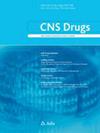Neurobiological and clinical effects of the antidepressant tianeptine.
Abstract
The precise neurobiological processes involved in depression are not clear, but it is recognized that numerous factors are involved, including changes in neurotransmitter systems and brain plasticity. Neuroplasticity refers to the ability of the brain to adapt functionally and structurally to stimuli. Impairment of neuroplasticity in the hippocampus, amygdala and cortex is hypothesized to be the mechanism by which cognitive function, learning, memory and emotions are altered in depression. The mechanisms underlying alterations in neuroplasticity are believed to relate to changes in neurotransmitters, hormones and growth factors. Structural changes in the hippocampus that have been proposed to be associated with depression include dendritic atrophy, reduced levels of cerebral metabolites, decreased adult neurogenesis (generation of new nerve cells) and reduced volume. Increased dendritic branching occurs in the basolateral nucleus of the amygdala. Reduced neuronal size and glial cell density occur in the prefrontal cortex. Clinically, tianeptine is an antidepressant effective in reducing symptoms of depression in mild to moderate-to-severe major depression, including over the long term. Tianeptine is also effective in alleviating the symptoms of depression-associated anxiety. It is generally well tolerated, with little sedation or cognitive impairment. The efficacy profile of tianeptine could be explained by its neurobiological properties observed in animal models. Tianeptine prevents or reverses stress-associated structural and cellular changes in the brain and normalizes disrupted glutamatergic neurotransmission. In particular, in the hippocampus, it prevents stress-induced dendritic atrophy, improves neurogenesis, reduces apoptosis and normalizes metabolite levels and hippocampal volume. Tianeptine also has beneficial effects in the amygdala and cortex and can reverse the effects of stress on neuronal and synaptic functioning. The neurobiological properties of tianeptine may provide an explanation not only for its antidepressant activity, but also for its anxiolytic effects in depressed patients and its lack of adverse effects on cognitive function and memory.





